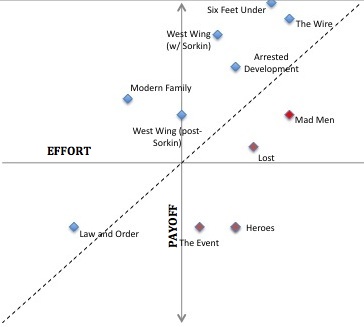Check out this graph from the NYT review of 24:
But “24” also jukes to the far side of political correctness and even left-wing paranoia. In two different seasons, the villains seeking to harm the United States are not Middle Eastern terrorists but conspirators directed by wealthy, privileged white Americans: in the second season, oil business tycoons tried to set off a Middle East war, and last year, Russian rebels turned out to be working in cahoots with a cabal of far-right government officials.
Then riddle me this: In how many places in America are you likely to avoid criticism/ seem more enlightened/ charm those hated liberal professors/ earn a glowing profile from those hated liberal journalists/ make friends by suggesting that what look like terrorist attacks by foreign enemies are really engineered by big business and/or the GOP?
Not many.
Which just goes to show how vapid a term “politically correct” is. It serves two related purposes: first, to reinforce an idea that the left is made up of rigid illiberal thought police; and second, to earn awful ideas consideration from reasonable people on the grounds that to dismiss them out of hand would be politically incorrect.
I once watched an episode of Politically Incorrect where someone suggested bombing all the Arab countries in order to scare off terrorists. He then said something like “Don’t ignore my idea just because it’s not politically correct.” The reason to reject that idea is that it would be unjust and calamitous. The irony is that when Politically Incorrect got booted off the air, it wasn’t for taking on a sacred cow of the left.
The term was popularized in the first place by Dinesh D’Souza. Then he wrote a book arguing that racism is merely “rational discrimination” by whites with a justified fear of “black cultural defects.” Then he got hired as a political analyst by the supposedly all-too politically correct CNN. For his next trick, he’s written a book arguing that conservatives can best discourage terrorism by allying themselves with radical mullahs against gay parents and women who have abortions.
But don’t dismiss his ideas out of hand! That would be political correctness.







